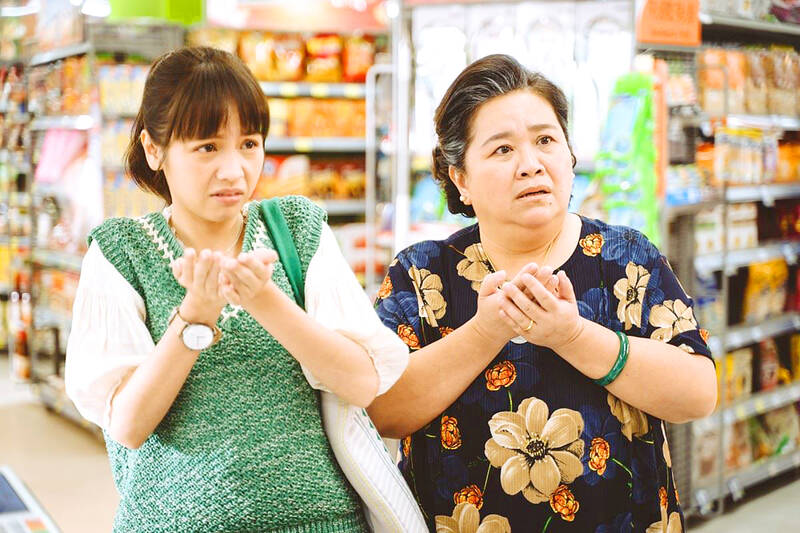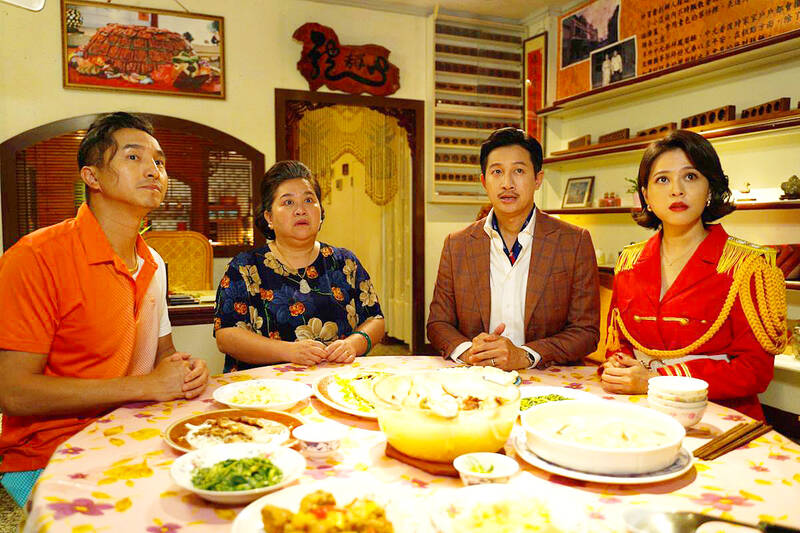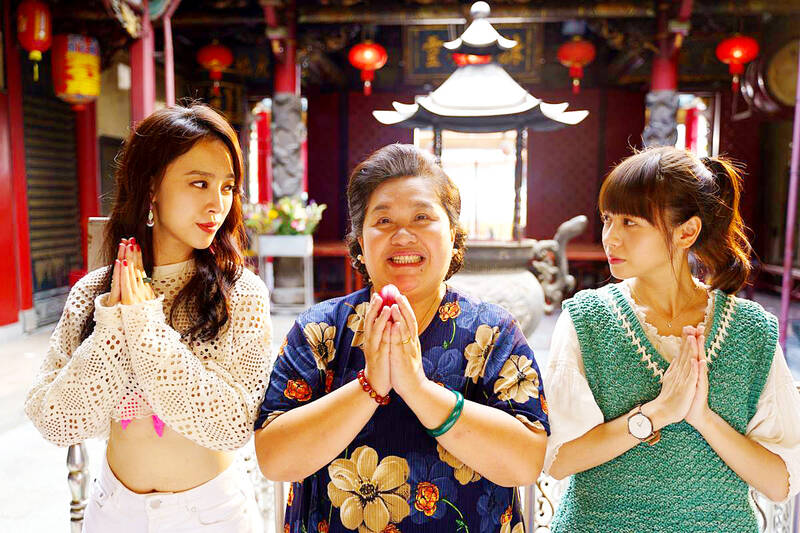Chock full of language puns, cultural references and so many celebrity cameos that a few had to be shown in a mid-credits “deleted scenes” sequence, one needs to be quite ingrained into local life to fully understand U Motherbaker: The Movie (我的婆婆怎麼把OO搞丟了). There were many bits that went over my head, but the plot is so fast paced and rowdy that it didn’t affect the overall enjoyment of the film.
Hyper-locality is exactly what this bawdy yet heart-warming screwball comedy aims for, though, as typical of Hoklo-language (also known as Taiwanese) films screened during the Lunar New Year break. They’re not meant to be taken seriously nor win awards. There was a time when the snob in me looked down on these productions, but they’re actually fun to watch and are easier to sit through than some of those slow-burning arthouse dramas of gloom and despair. For foreign residents, it’s a curious window into Taiwanese pop culture and what’s funny for the masses, even if you don’t quite get what’s going on.
What keeps surprising me is the solid plots that drive the silliness, as mentioned in my review for Hanky Panky (大釣哥, Jan. 19, 2017). There’s nothing groundbreaking or any mind-bending twists, but there are almost no plot holes and the multiple storylines are resolved neatly in a way that makes sense. Sometimes, it’s better not to try too hard.

Photo courtesy of Vie Vision Pictures
U Motherbaker is based on the wildly popular 2020 television series of the same name, starring the beloved traditional bakery matriarch Tsai-hsiang (Chung Hsin-ling, 鍾欣凌). I did not watch the series, but it’s immediately understable why the Tsai-hsiang character is so appealing and won Chung a Golden Bell for best actress in a television drama. She’s loud, overly dramatic, scatterbrained and often conniving, but also self-deprecating, caring and innocent, serving as a wonderful, wholesome character to get into various mishaps.
For her big screen debut, Tsai-hsiang finds herself in deep trouble. Posing as a waitress, she sneaks into a movie wrap party to meet her idol, the dashing young singer OO (Aaron Yan, 炎亞綸), but a series of mishaps leads to OO’s disappearance. Her director son Ping-jen (Johnny Yang, 楊銘威), who helped her with the scheme, goes missing after the incident, and with Tsai-hsiang being the last person to see OO, the rest of the family launches an all-out manhunt with the police on their tails.
The search party consists of Hsiao-ou (Huang Pei-jia, 黃姵嘉), who was once married to Tsai-hsiang’s deceased youngest son, her baker boyfriend Fa-kuei (Joe Chang), Tsai-hsiang’s self-centered and constantly bickering children (Sam Wang, 王少偉, Jill Su, 蘇晏霈 and Darren Chiu, 邱凱偉) and Ping-jen’s sexually-liberated lover Ta-mei (Ruby Lin, 林筳諭). All of them are dealing with personal or relationship issues, and are forced to confront them, and each other, as the plot moves forward.

Photo courtesy of Vie Vision Pictures
In a parallel side story, Tsai Hsiang’s pineapple farmer boyfriend Brother Yi (Hsu Chieh-hui 許傑輝) loses the engagement ring (O-shaped like the missing singer’s moniker) on the latest of numerous proposal-gone-awry, and also enlists a number of characters to help search for it.
Wackiness aside, the film examines many emotional issues, especially modern family dynamics and romantic love, presenting them in a moving yet reasonable way that avoids being too sappy or overbearing. There are some cringey moments but the attitudes are generally healthy, and it’s good to see that these mainstream films are employing fewer toxic tropes that have for years negatively affected societal expectations on relationships.
The goofy, kind-hearted Tsai-hsiang perhaps represents the new generation of matriarch and mother-in-law who does not have to be stern and demanding. Although she inevitably butts heads with the younger generation, she is able to earn their respect in her own way.

Photo courtesy of Vie Vision Pictures

Aug. 4 to Aug. 10 When Coca-Cola finally pushed its way into Taiwan’s market in 1968, it allegedly vowed to wipe out its major domestic rival Hey Song within five years. But Hey Song, which began as a manual operation in a family cow shed in 1925, had proven its resilience, surviving numerous setbacks — including the loss of autonomy and nearly all its assets due to the Japanese colonial government’s wartime economic policy. By the 1960s, Hey Song had risen to the top of Taiwan’s beverage industry. This success was driven not only by president Chang Wen-chi’s

Last week, on the heels of the recall election that turned out so badly for Taiwan, came the news that US President Donald Trump had blocked the transit of President William Lai (賴清德) through the US on his way to Latin America. A few days later the international media reported that in June a scheduled visit by Minister of National Defense Wellington Koo (顧立雄) for high level meetings was canceled by the US after China’s President Xi Jinping (習近平) asked Trump to curb US engagement with Taiwan during a June phone call. The cancellation of Lai’s transit was a gaudy

From Godzilla’s fiery atomic breath to post-apocalyptic anime and harrowing depictions of radiation sickness, the influence of the nuclear bombings of Hiroshima and Nagasaki runs deep in Japanese popular culture. In the 80 years since the World War II attacks, stories of destruction and mutation have been fused with fears around natural disasters and, more recently, the Fukushima crisis. Classic manga and anime series Astro Boy is called “Mighty Atom” in Japanese, while city-leveling explosions loom large in other titles such as Akira, Neon Genesis Evangelion and Attack on Titan. “Living through tremendous pain” and overcoming trauma is a recurrent theme in Japan’s

As last month dawned, the Democratic Progressive Party (DPP) was in a good position. The recall campaigns had strong momentum, polling showed many Chinese Nationalist Party (KMT) lawmakers at risk of recall and even the KMT was bracing for losing seats while facing a tsunami of voter fraud investigations. Polling pointed to some of the recalls being a lock for victory. Though in most districts the majority was against recalling their lawmaker, among voters “definitely” planning to vote, there were double-digit margins in favor of recall in at least five districts, with three districts near or above 20 percent in